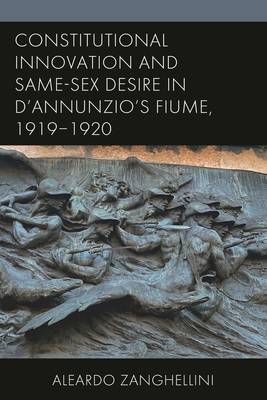
- Retrait gratuit dans votre magasin Club
- 7.000.000 titres dans notre catalogue
- Payer en toute sécurité
- Toujours un magasin près de chez vous
- Retrait gratuit dans votre magasin Club
- 7.000.0000 titres dans notre catalogue
- Payer en toute sécurité
- Toujours un magasin près de chez vous
Constitutional Innovation and Same-Sex Desire in d'Annunzio's Fiume, 1919-1920
Aleardo Zanghellini
221,45 €
+ 442 points
Description
Drawing on novel archival evidence that sheds light on Anglo-Italian diplomatic relations and the French-Italian contest for power in the Adriatic, this book recounts the story of decadent poet Gabriele D'Annunzio's occupation of Fiume. Determining the fate of this Italian enclave in coastal Croatia had proved impossible at the Paris Peace Conference. In September 1919, D'Annunzio and his 'legionnaires' installed themselves in Fiume in a bid to embarrass Italy into declaring its annexation. In the months that followed, the poet did his best to fashion Fiume into his ideal political community, culminating in the proclamation of a Constitution known as the Carnaro Charter. The Charter was as visionary as it was short-lived: having reached an agreement with Yugoslavia on the status of Fiume, Italy put an end to the poet's socio-political experiment in December 1920. In addition to offering the most comprehensive and detailed analysis to date of the Carnaro Charter, the book shows what has eluded all historians of D'Annunzio's Fiume: that the sublimation and discursive circulation of same-sex desire was integral to shaping and sustaining the political and legal order of the occupation, and that D'Annunzio's love-lore in Fiume was continuous with broader homoerotic preoccupations in his oeuvre.
Spécifications
Parties prenantes
- Auteur(s) :
- Editeur:
Contenu
- Nombre de pages :
- 494
- Langue:
- Anglais
- Collection :
Caractéristiques
- EAN:
- 9781683934356
- Date de parution :
- 15-12-24
- Format:
- Livre relié
- Format numérique:
- Genaaid
- Dimensions :
- 152 mm x 229 mm
- Poids :
- 775 g

Les avis
Nous publions uniquement les avis qui respectent les conditions requises. Consultez nos conditions pour les avis.






